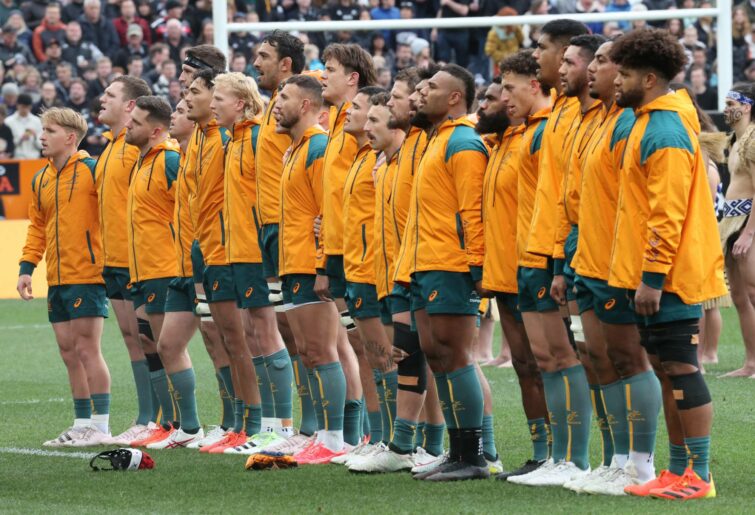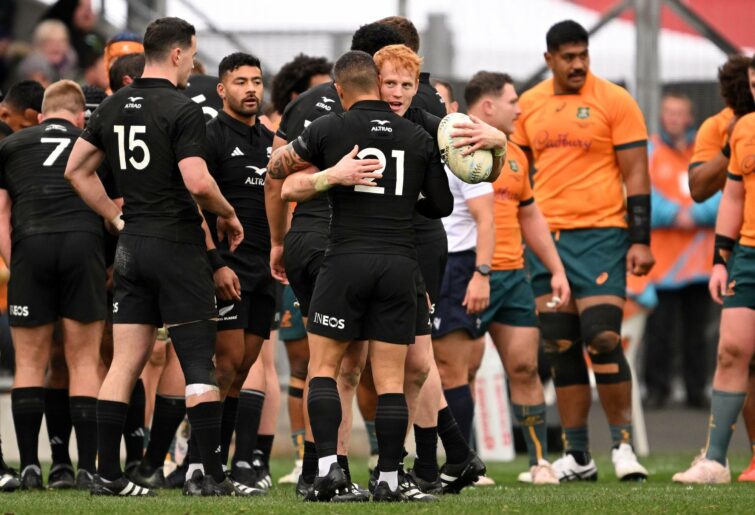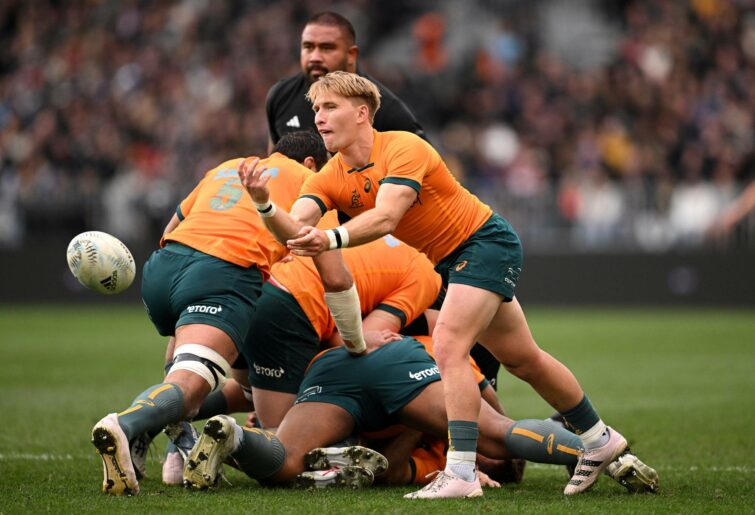When it comes to Test rugby, I’ve never understood the term ‘dead rubber’. Yes, a trophy or series may already have been won, such as this 2023 Bledisloe Cup, but for the players and coaches involved, Test rugby doesn’t do dead rubbers.
There is always something to play for; a winning run to be maintained, a losing run to be snapped, a World Cup squad place to be confirmed, an oft-maligned coach looking to bow out on a high, a messianic coach looking to justify the hopes of a nation being heaped upon his shoulders.
Ask any player who has played Test rugby. Nothing is taken for granted. Every Test win is savoured, every Test defeat hollows out the pit of the stomach like the loss of a beloved family pet.
Think about the percentage of players who ‘retire’ from Test rugby. Who get to bow out on their own terms.
It’s a remarkably low number. Accordingly, all players enter every Test knowing it might be their last. That’s because for many, it actually is.
In that context, Saturday’s 23-20 win by the All Blacks over the Wallabies in Dunedin, a willing and absorbing contest, was no surprise. Not the closeness of the result, not the vitality and dash shown by the Wallabies in the first half, not the gradual wresting of control back by the All Blacks in the second half.

(Photo by Peter Meecham/Getty Images)
In the end, it was a near-run thing, Richie Mounga’s piercing, match-deciding 40m penalty not coming until the 79th minute.
A minute before it was the Wallabies, edging towards All Black territory, looking for an opportunity to win their own penalty, and the opportunity for a last-minute kick to break the deadlock; an outcome that would have been equally deserved.
It never came; Quade Cooper knocked forward, the scrum couldn’t hold straight, and, aside from one final kick off, the Wallabies never got their hands on the ball again.
It was a different story to start with, with the Wallabies clean and efficient, finding their tempo and breaking into space on multiple occasions. Marika Koroibete stepped out over the soccer touchline, but inside the rugby touchline, and with Carter Gordon drilling the sideline conversion, the Wallabies were on their way.
Tom Hooper – better suited this week at 6 – discovered a liking for the same corner, and 14-0 had Eddie Jones, for a few minutes at least, going easy on the telecommunications equipment.
Then followed an intercept on defence by Jordan Petaia, a desperate act which, a year ago, would have earned him a yellow card, but here saved a certain try; Mark Nawaqanitawase no chance to snuff out Braydon Ennor or any of the three men spare on his outside.
It was a moment worth far more than what was credited at the time. Not just for the five or seven points, but because it would have settled the All Blacks, and had them feeling that they were in the contest, not increasingly feeling like they had to chase the game.
While the Wallabies wouldn’t score another try, they continued to control the match impressively. Here was something much closer to an optimal possession level, allied with a good balance between central and wide attack, positive play in transition and good support play.
Had Tate McDermott managed to wriggle over in the 28th minute – would an earlier dive have seen him escape the clutches of Sam Whitelock and Ardie Savea? – that would probably have represented a truer reflection of their dominance.
As it was, 17-3 was handy enough, but it left the door open slightly too far.
For the All Blacks, this was more like their oft-familiar opening of a Test season where, for years, the routine was to fluff around for 40 minutes like strangers who had been introduced to each other for the first time on the bus to the ground, shaking off cobwebs, rust and other impediments, before finally clicking into gear in the second half.
Of course, the Wallabies had a lot to do with taking them out of their comfort zone, but far too much of it was self-inflicted for Ian Foster’s liking.

Finlay Christie is replaced by Aaron Smith of New Zealand during The Rugby Championship & Bledisloe Cup match between the New Zealand All Blacks and the Australia Wallabies at Forsyth Barr Stadium on August 05, 2023 in Dunedin, New Zealand. (Photo by Joe Allison/Getty Images)
With the possible exception of South Africa, no nation better understands the fundamentals of rugby better than New Zealand. Get the basics right, keep your error rate low, take opportunities when they are presented, and you win Test matches.
But throw crooked or too far, drop the ball in contact, hesitate in defence, be first knee to touch the grass at a scrum, miss touch from penalty, offer up soft, easy marks inside the 22, and that’s a sure-fire way to be staring down the barrel of a Test defeat.
So, what was it that changed things after half-time? Savea admitted to the All Blacks being “smacked” in the first half, needing to come out and throw the first punch in the second. More specifically, it was three straight penalties in the first five minutes that afforded them the territory they hadn’t seen all first-half.
The All Blacks cut down their error rate, which enabled the possession pendulum to shift, which in turn allowed them to control the tempo of the match. All of a sudden, while they were never out of the contest, the Wallabies were now having to play on their opponent’s terms; including having the blowtorch applied to their scrum.
The All Blacks would have their ‘McDermott moment’ too; Leicester Fainga’anuku looking certain to have scored under the posts, right up until it became apparent he hadn’t.
It was heavy going nonetheless; a try each to the debutants, Shaun Stevenson and Samipeni Finau, but not a lot of joy in between, as the Wallabies absorbed what was being thrown at them until, against the tide with eight minutes remaining, Cooper levelled things up at 20-20.
Everybody loves a good rugby cliché, and in this instance, it’s fair to say that both camps will have taken plenty from this match.
The All Blacks got much needed Test minutes into players who needed it. They found a player in Finau who – in a like for like, Shannon Frizell kind of way – looks made for Test rugby; found one who probably isn’t (Stevenson); and one who will be, but not just yet (Tamaiti Williams).
Not that it needed re-stating, but there was reconfirmation that it is a long, long way down from Aaron Smith to Finlay Christie. Note how Smith, at the completion of his 118th Test match, the last at his home ground, an occasion where he might reasonably have been celebrating with family and friends on the sideline, chose to do extra run-throughs with the non-playing Barrett family and other squad members.
That, aspiring youngsters, is how you get to 118 Tests. Work harder than other players and get to the ball faster than them.
There was also another reminder that, no matter how much Damian McKenzie tears up Super Rugby, he is not the man to dig his side out of a hole when things aren’t going the All Blacks’ way.
With the Wallabies more than up for the contest, what the All Blacks needed from McKenzie was a sense that he had the match under control. As ever, his instinct was to endeavour to win each moment with a touch of skill, a burst of pace, or a speculative kick and regather.
McKenzie’s place in the World Cup squad is assured, due to his versatility, and the need to negotiate pool matches against Namibia and Uruguay without over-exposing Richie Mounga. That’s a long way from the composure and clear-headedness that will be required to topple Ireland or South Africa in a sudden-death quarter-final.
There will also be quiet concern about the form of Samisoni Taukeiaho; not running with same confidence and bruise factor that first elevated him into the side, and with his line-out throwing a touch off elite level.
On the other hand, as well as Scott Barrett is travelling, there was another reminder of how essential the leadership of Sam Whitelock is to this side. And no smile was broader at the end of the match, than the one on the face of Fletcher Newell, whose return to top-level rugby after a long lay-off, couldn’t have come at a better time.

Tate McDermott of Australia (Photo by Joe Allison/Getty Images)
For the Wallabies, the trajectory remains upwards, each week an improvement on the one before. There are no prizes to be won for pointing out the depth issues in the front row; expect some tough discussions to be had this week, leading up to finalisation of the World Cup squad.
Whatever happens in France, the Wallabies will not be serious contenders if their scrum starts sliding backwards and upwards, like it did in the second half of this match.
The side seems to be settling into a more coherent game-plan, with players in motion in attack as genuine running options, and a developing flyhalf who continues to grow in confidence, picking out his targets.
Out wide, while Koroibete will always be a distinctive, ‘one out of the box’ kind of player, there is a sense that Nawaqanitawase and Andrew Kellaway are developing into an assured and highly effective combination.
Even more pleasing was the composure shown on defence, the All Blacks made to scrap for every metre, with nary a hint of a breakdown in the Wallabies’ defensive discipline.
One disappointment was the concession of a free kick immediately following a superb 50:22 kick by Gordon. If any lesson should have been learned from Marvel Stadium last year, it is that when a referee warns you repeatedly not to slow play down, you take that warning seriously.
Referee Karl Dickson himself copped a bit of flak afterwards for his application of the advantage law, three times allowing the All Blacks to advance for extended periods before reverting back to the original penalty.
It’s not quite the first order issue some people think it is.
As always, these things are a matter of subjective decision making and striking the right balance. Nobody likes what is effectively ‘dead time’, where a side plays under advantage only for play to be restarted as if that passage of time never happened.
But what of the alternative? Shorten the advantage and sides will simply opt not to risk spurning an already certain penalty. That would have delivered the All Blacks exactly the same outcome as what referee Dickson provided them.
That’s also a recipe for a more static game, more shots at goal, and more 5m lineout drives.
Who wants to see that? I’d rather watch a ‘dead rubber’ thanks.































































































